Updated April 3, 2023
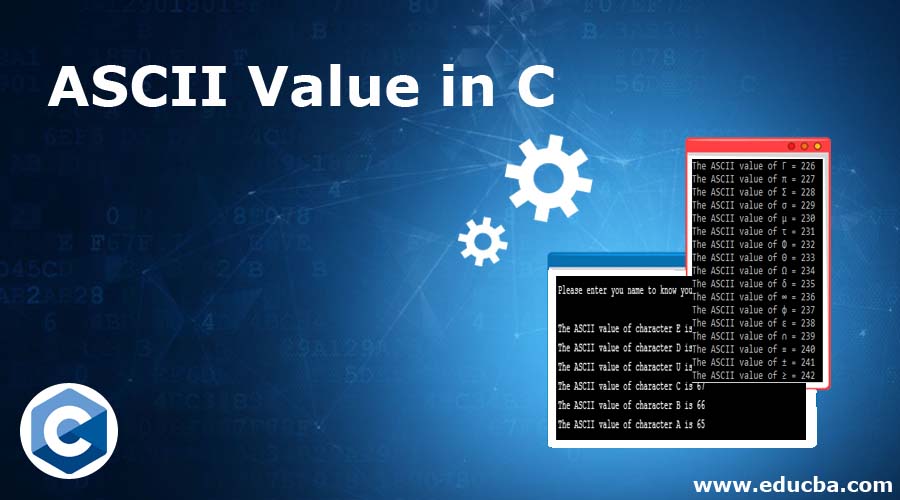
Introduction to ASCII Value in C
ASCII is abbreviated as the “American Standard Code for Information Interchange”. As we are humans we have our language to understand the same way machine also have the same thing to understand characters, digits, special characters that is ASCII representation of the character. It is a character encoding schema that is used for electronic communication.ASCII contains numbers, each character has its own number to represent. We have 256 character to represent in C (0 to 255) like character (a-z, A-Z), digits (0-9) and special character like !, @, # etc. This each ASCII code occupied with 7 bits in the memory. Let suppose ASCII value of character ‘C’ is 67. When we give input as ‘B’ machine treat it as 67 internally and stores its address. When we get back our original number compiler gives you 67 and other internal software converts these values into its equivalent characters.
ASCII values Table
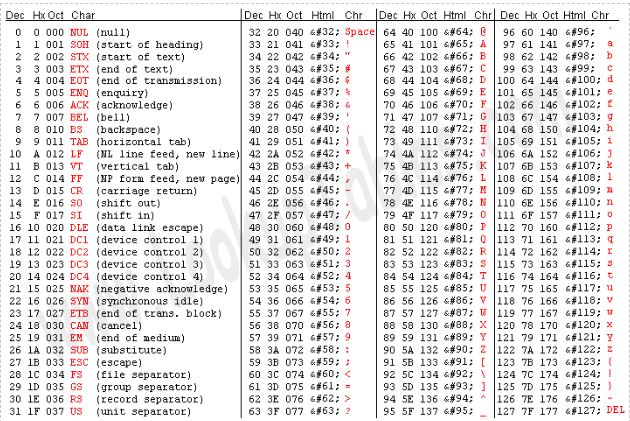
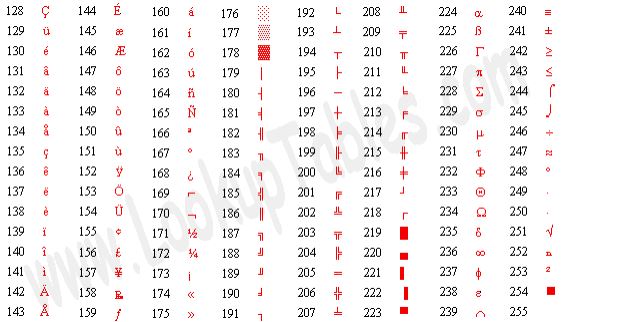
How does ASCII Value Represent Internally in C?
1. Let take an example string as “ABCDEFG HIJK LMNO”.
2. When we pass this instruction to machine it will not store it as“ABCDEFG HIJK LMNO” but instead it will store its equivalent ASCII value.
3. Therefore now machine stored value is “65 66 67 68 69 70 71 32 72 73 74 75 32 76 77 78 79”.
4. ASCII value is 65, B is 66, C is 67, and so on. Space ASCII value is:
Syntax:
int p;
for(int p=0;p<255;p++)
{
Printf(“%c,%d”,p,p);//%c is for display character and %d is for ASCII value
} Examples to Implement ASCII Value in C
Below are the examples.
1. Capital A to Z ASCII Values.
Code:
//including basic C libraries
#include <stdio.h>
//main method for run C application
int main()
{
//declaration int variable
int capitalChars;
//iterating Capital ASCII values
for(capitalChars=65;capitalChars<91;capitalChars++) // for loop from 65 to 90
{
//display ASCII values for its equivalent characters
printf("\n\tThe equivalent ASCII for %c character is %d", capitalChars,capitalChars);
}
return 0;
}Output:
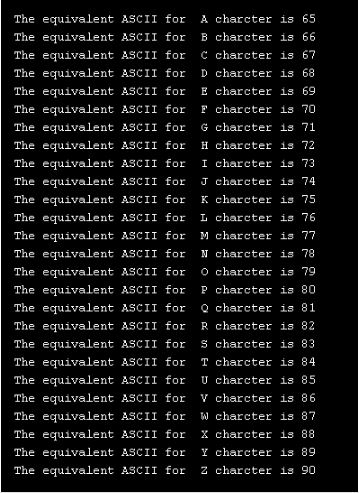
2. Small A to Z ASCII Values
Code:
//including basic C libraries
#include <stdio.h>
//main method for run C application
int main()
{
//declaration int variable
int lowerChars;
//iterating lowe case characters ASCII values
for(lowerChars=97;lowerChars<123;lowerChars++) // for loop from 97 to 122
{
//display ASCII values for its equivalent characters
printf("\n\tThe equivalent ASCII for lower case %c character is %d", lowerChars,lowerChars);
}
return 0;
}Output:
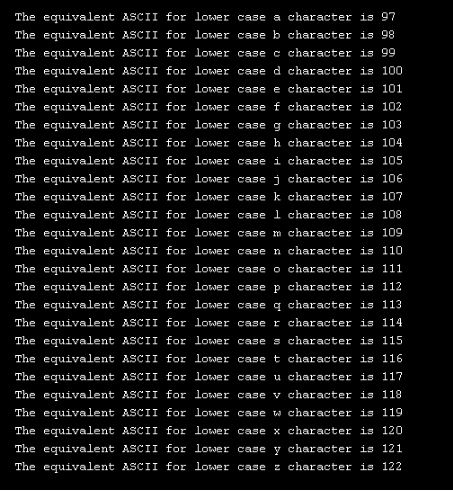
3. Space ASCII Value
Code:
//including basic C libraries
#include <stdio.h>
//main method for run C application
int main()
{
//declaration int variable
int space;
//iterating lowe case characters ASCII values
for(space=32;space<33;space++) // for loop 32
{
//display ASCII values for its equivalent characters
printf("\n\tThe equivalent ASCII for space %c is %d", space,space);
}
return 0;
}Output:
![]()
4. Special Characters ASCII Values
Code:
//including basic C libraries
#include <stdio.h>
//main method for run C application
int main()
{
//declaration int variable
int specialChars;
//iterating lowe case characters ASCII values
for(specialChars=33;specialChars<48;specialChars++) // for loop from 32 to 47
{
//display ASCII values for its equivalent characters
printf("\n\tThe equivalent ASCII for %c special character is %d", specialChars,specialChars);
}
for(specialChars=58;specialChars<65;specialChars++) // for loop from 58 to 64
{
//display ASCII values for its equivalent characters
printf("\n\tThe equivalent ASCII for %c special character is %d", specialChars,specialChars);
}
for(specialChars=123;specialChars<127;specialChars++) // for loop from 123 to 126
{
//display ASCII values for its equivalent characters
printf("\n\tThe equivalent ASCII for %c special character is %d", specialChars,specialChars);
}
return 0;
}Output:
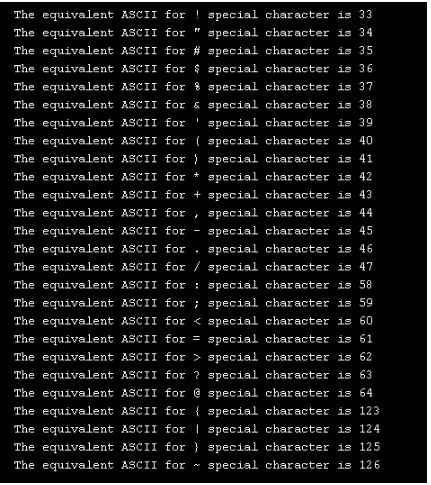
5. All ASCII Values in One Place
Code:
//including basic C libraries
#include <stdio.h>
//main method for run C application
int main()
{
//declaration int variable
int allChars;
//iterating lowe case characters ASCII values
for(allChars=0;allChars<256;allChars++) // for loop from 0 to 255
{
//display ASCII values for its equivalent characters
printf("\n\tThe ASCII value of %c is %d", allChars,allChars);
}
return 0;
}Output:
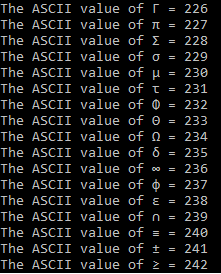
6. Given Name ASCII Values
Code:
//including basic C libraries
#include <stdio.h>
//main method for run C application
int main()
{
// declaring char array variable
char charArray[20];
// declaring int variable
int var=0;
//Asking user to enter any name
printf("\n\tPlease enter you name to know your name ASCII values: ");
scanf("%s", charArray);
while(charArray[var]!='\0') // iterating array characters sequentially
{
//display the your name character ASCII values
printf("\n\tThe ASCII value of character %c is %d", charArray[var],charArray[var]);
var++;
}
return 0;
}Output:

Conclusion
ASCII in C is used to represent numeric values for each character. This each character internally stored as ASCII value but not the same character we have given. We can display lower case, upper case alphabets, special characters etc. ASCII values by using their corresponding order. Present we have 255 ASCII characters are there in C.
Recommended Articles
This is a guide to ASCII Value in C. Here we discuss the Introduction to ASCII Value in C and its Table along with the different examples and code implementation. You can also go through our other suggested articles to learn more –


